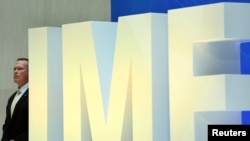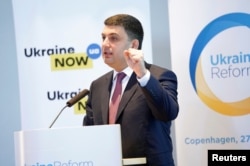The International Monetary Fund announced Friday it had reached an agreement with Ukraine on economic policies that would unlock a new loan deal that will provide nearly $4 billion.
The new 14-month standby loan deal replaces an existing four-year financial aid package agreed in March 2015 and due to expire in five months, the IMF said in a statement.
The agreement must be approved by the IMF board, which will come later in the year after authorities in Kyiv approve a 2019 budget "consistent with IMF staff recommendations and an increase in household gas and heating tariffs," a step the government had agreed on but never implemented.
But the deal also stresses the need for "continuing to protect low-income households."
Ukraine Prime Minister Volodymyr Groysman had been seeking the additional financing from the Washington-based lender to help his crisis-hit nation.
Groysman on Friday announced a gas price increase of 23.5 percent to take effect November 1.
He said the "incredible efforts" of Ukrainian negotiators managed to reach a compromise with the IMF and reduce the initial demand to raise prices by 60 percent.
"If we are not able to continue cooperation with our international partners ... this could lead to the country being put into default," he said.
Ukraine has not received any money from the IMF since April 2017, when the fund released $1 billion for the cash-strapped country to repay loans. It had received less than $9 billion of the original $17.5 billion package.
Talks on economic reform measures that would satisfy IMF requirements and allow the release of further aid had been hung up for months, as the fund awaited the government's approval of a budget, pension reform and an anti-corruption court.
A gas price hike is a sensitive issue for the cash-strapped country as its pro-Western leadership faces presidential and parliamentary elections in 2019.
The IMF said the new loan "will provide an anchor for the authorities' economic policies during 2019."
Building on progress under the previous financing package, the loan will "focus in particular on continuing with fiscal consolidation and reducing inflation, as well as reforms to strengthen tax administration, the financial sector and the energy sector," the IMF said.
An IMF lifeline helped the country to recover from crises sparked by a Russian-backed war in the separatist industrial east that began in April 2014 and has claimed more than 10,000 lives.
The loss of industries in the war zone and flight of foreign investors saw the former Soviet republic's economy shrink by 17 percent in 2014-2015.
The IMF now forecasts the economy will grow by 3.5 percent this year and 2.7 percent in 2019.
Following the announcement, debt rating agency Standard and Poor's affirmed the country's credit score at "B-" with a stable outlook.
"We expect the new arrangement will aid Ukraine's efforts to cover sizable external debt obligations maturing next year, and also help to anchor macroeconomic policies through the 2019 presidential and parliamentary elections," S&P said in a statement.
The IMF loan is also likely to unlock credit from other international donors, the ratings agency said.





